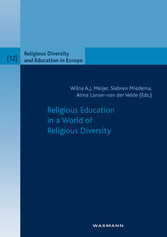Suchen und Finden
Service
Contents
6
Religious Education in a World of Difference. Introduction
8
1. Introduction
8
2. ISREV. A short historical overview
8
3. The development of pluralist RE in Britain
13
4. The historicity and reflexivity of learning and understanding
17
References
19
Towards a New Paradigm of RE in Eastern Europe
22
1. ARTE and its Declaration
22
2. Stating the problem. Progress or adaptation?
25
3. Landmarks of progress
28
4. Shift of paradigms and two vectors of European development
30
5. Humanitarian paradigm of RE
33
References
37
Pedagogical Challenges for Educating an Authentic Religious Identity and Responsible Pluralism
42
1. Defining the context
42
2. Negotiating religious and cultural identity
44
3. Exploring boundaries
46
4. Building bridges across translocational positionalities
47
5. Pedagogical challenges of building a pluralistic future
49
6. Concluding remarks
51
References
52
Reforming and Transforming Tradition
54
1. Diversity of educational forms
54
2. Tolerance and the diversity of religious forms
56
3. Tradition: measuring diversity
59
4. Transformation
63
5. Conclusion
66
References
66
Understanding Religious Education Through Human Rights Values
68
1. Introduction
68
2. Human rights values
70
3. An analyses of students’ conceptual understanding of human rights before the formal facilitation of human rights values ( HRV)
74
4. A conceptual framework and an analysis of students’ reflections and reflexivity on HRV in praxis
79
5. Conclusion
83
References
84
Inter-Buddhist Religious Education in Ontario’s Public Schools: A Model for Accommodating Religious Diversity
86
1. Introduction
86
2. Buddhism and public recognition
88
3. Religion in “Multiculturalism” and Schools in Ontario
90
4. Buddhist ecumenism in Toronto and inter-Buddhist religious education
95
5. A model of inter-Buddhist religious education
96
6. Conclusion
100
References
100
Liberal Religious Education in Japan: From the Jinzo Naruse’s Perspective
102
1. Introduction
102
2. Transition of Naruse’ s religious views
103
3. Religious education of Japan Women’s University
110
4. Conclusion
114
References
115
Silence, Exile and Cunning: Postcolonial Conversations in Religious Diversity
118
1. Postcolonialism and its uncertainty
118
2. Enactment of third space
122
3. Implications for hybridity of religious educators
123
4. Promise for practice
124
5. Practical implications
125
6. Skills for this work
126
7. Concluding note
128
References
129
Developing an Interfaith Dimension in RE: Theological Foundations and Educational Framework with Special Reference to Turkish Experience
132
1. Religious education and tradition
132
2. The present state: possibilities and problems
134
3. A starting point in inter-religious education: a believing mind
142
References
149
The Media Culture Approach to Religious Education. An Outline with a Focus on Interreligious Learning
150
1. The media culture approach to RE – an illustrative introduction
150
2. The media culture approach to RE – theoretical perspectives
152
3. Popular media culture as a lingua franca for intercultural learning? – some empirical findings
154
4. The triangle of interreligious learning
157
5. Globalization and cultural pluralism within popular media culture
158
6. Conclusion
161
References
163
Spiritual Intelligence and its Contribution to Religious Education Leadership in a Time of Religious Pluralism and Divisiveness
166
Introduction
166
1. The social, cultural, political and educational context
166
2. Criteria for religious education leadership
172
3. The role of Spiritual Intelligence in promoting effective leadership in religious education
173
4. Discussion
177
5. Conclusion
179
References
180
Cultural Transmission and the Balance Between Tradition and Enlightenment. The Example of Islam
182
1. Introduction. The virtual ummah
182
2. The educational balance of tradition and enlightenment versus the idea of ‘ The Enlightenment’ in the public debate on Islam ( in five theses)
185
3. In conclusion: towards a reflexive form of Islamic education
191
References
194
Religious Education between Certainty and Uncertainty. Towards a Pedagogy of Diversity
196
1. Introduction
196
2. Desecularization, deprivatization and plurality
197
3. Security instead of certainty
199
4. A pedagogy of diversity
203
5. A historized, contextual and temporal basis
204
References
205
List of Authors and Editors
208
Alle Preise verstehen sich inklusive der gesetzlichen MwSt.










